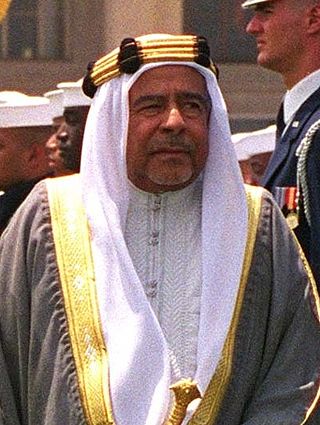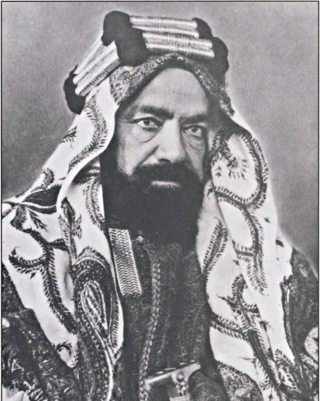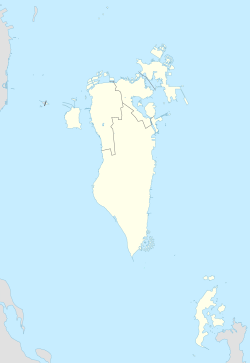
Hamad bin Isa bin Salman Al Khalifa is King of Bahrain since 14 February 2002, after ruling as Emir of Bahrain from 6 March 1999. He is the son of Isa bin Salman Al Khalifa, the previous and first emir. The country has been ruled by the Al Khalifa dynasty since 1783.

Isa bin Salman bin Hamad Al Khalifa was a Bahraini royal who served as the first Emir of Bahrain from 1961 until his death in 1999.

The House of Khalifa is the ruling family of the Kingdom of Bahrain. The Al Khalifas profess Sunni Islam and belong to the Anizah tribe. Some members of this tribe joined the Utub alliance which migrated from Najd in central Arabia to Kuwait, then ruled all of Qatar, more specifically Al Zubarah, which they built and ruled over before settling in Bahrain in the early 17th century. The current head of the family is King Hamad bin Isa Al Khalifa, who became the Emir of Bahrain in 1999 and proclaimed himself King of Bahrain in 2002, in fact becoming a constitutional monarch.
Madinat Hamad or Hamad Town is a primarily commuter city within northern Bahrain. It was a municipality of Bahrain in the central part of the country. Split from the municipality of Ar Rifa' wa al Mintaqah al Janubiyah in 1991, its territory is now in the Northern Governorate. Its name refers to the current king of Bahrain, Hamad Bin Isa Al Khalifa. The city is culturally diverse, housing a proportionally mixed Shia-Sunni population of varying socio-economic backgrounds. Today, Hamad Town is an epitome of Bahraini multiculturalism, with no single ethnic or religious group making up the majority of inhabitants.

The King Fahd Causeway is a 25 km (15.5 mi) long series of bridges and causeways connecting Khobar, Saudi Arabia, and Al Jasra, Bahrain.

Salman bin Hamad bin Isa Al Khalifa is Crown Prince and Prime Minister of Bahrain. He is also the deputy supreme commander of the Bahrain Defence Force.
Sheikh Faisal bin Hamad Al Khalifa was a member of the Bahrain's ruling family, the House of Khalifa.

The Catholic Church in Bahrain is part of the worldwide Catholic Church, under the spiritual leadership of the Pope in Rome.

Salman bin Hamad Al Khalifa, was the ruler of Bahrain from 20 February 1942 until his death in 1961. His title was Hakim of Bahrain. He was succeeded by his son Isa bin Salman Al Khalifa in December 1961.

Hamad bin Isa Al Khalifa KCIE, CSI was the Hakim (ruler) of Bahrain from the death of his father, Isa bin Ali, on 9 December 1932 until his own death in 1942.

Isa bin Ali Al Khalifa was the ruler of Bahrain from 1869 until his death. His title was Hakim of Bahrain. He is one of the longest reigning monarchs of the region, a reign lasting 63 years. He was forced by the British political advisor, Clive Kirkpatrick Daly, to abdicate in 1923, although this "abdication" was never recognised by Bahrainis who considered his successor Hamad only as a viceruler until Isa's death in 1932.

Al Dawasir is an Arab tribe in Saudi Arabia, Bahrain, Qatar, and other Gulf states. Its main base is in Wadi Al-Dawasir in Saudi Arabia. The Al Dawasir tribe is among the most powerful and influential tribes of Arabia, as they are the maternal uncles of much of the House of Saud family.

Sabika bint Ibrahim Al Khalifa is the first wife and consort of the king of Bahrain, Hamad bin Isa Al Khalifa. She is the mother of Crown Prince Salman bin Hamad Al Khalifa.
Succession to the Bahraini throne is determined by agnatic primogeniture amongst the male descendants of King Hamad bin Isa Al Khalifa. However, the ruling King of Bahrain has the right to appoint any of his other sons as his successor according to article 1 of the Constitution of Bahrain.
Mohamed Bin Abdulrahman Al-Hassan Al-Fakhro, nicknamed Half of the World, was a wealthy businessman from Qatar. He fought in the Zubara War of 1935 with the Al Thani. He was given his nickname by the then ruler of Qatar, Sheikh Abdullah bin Jasssim Al Thani for his vast knowledge and wisdom.
Abdullah bin Hamad bin Isa Al Khalifa is the second son of the present King of Bahrain, Hamad bin Isa Al Khalifah, and his first wife, Sabika bint Ibrahim Al Khalifa.
Hessa bint Salman Al Khalifa was a member of the Bahraini royal family, the mother of the current monarch of Bahrain Hamad bin Isa Al Khalifa.
The Supreme Defense Council (SDC) is Bahrain's highest defense authority responsible for making highest level of decisions regarding defense and security. It consist of 14 members, all of whom are drawn from the Al Khalifa ruling family.

Khalid bin Abdullah Al Khalifa is a Bahraini royal, engineer and deputy prime minister of Bahrain.
The Order of Sheikh Isa bin Salman Al Khalifa is a Bahraini order of merit. It is the highest decoration in the Kingdom of Bahrain and is named after Isa bin Salman Al Khalifa, the former Emir of Bahrain.















